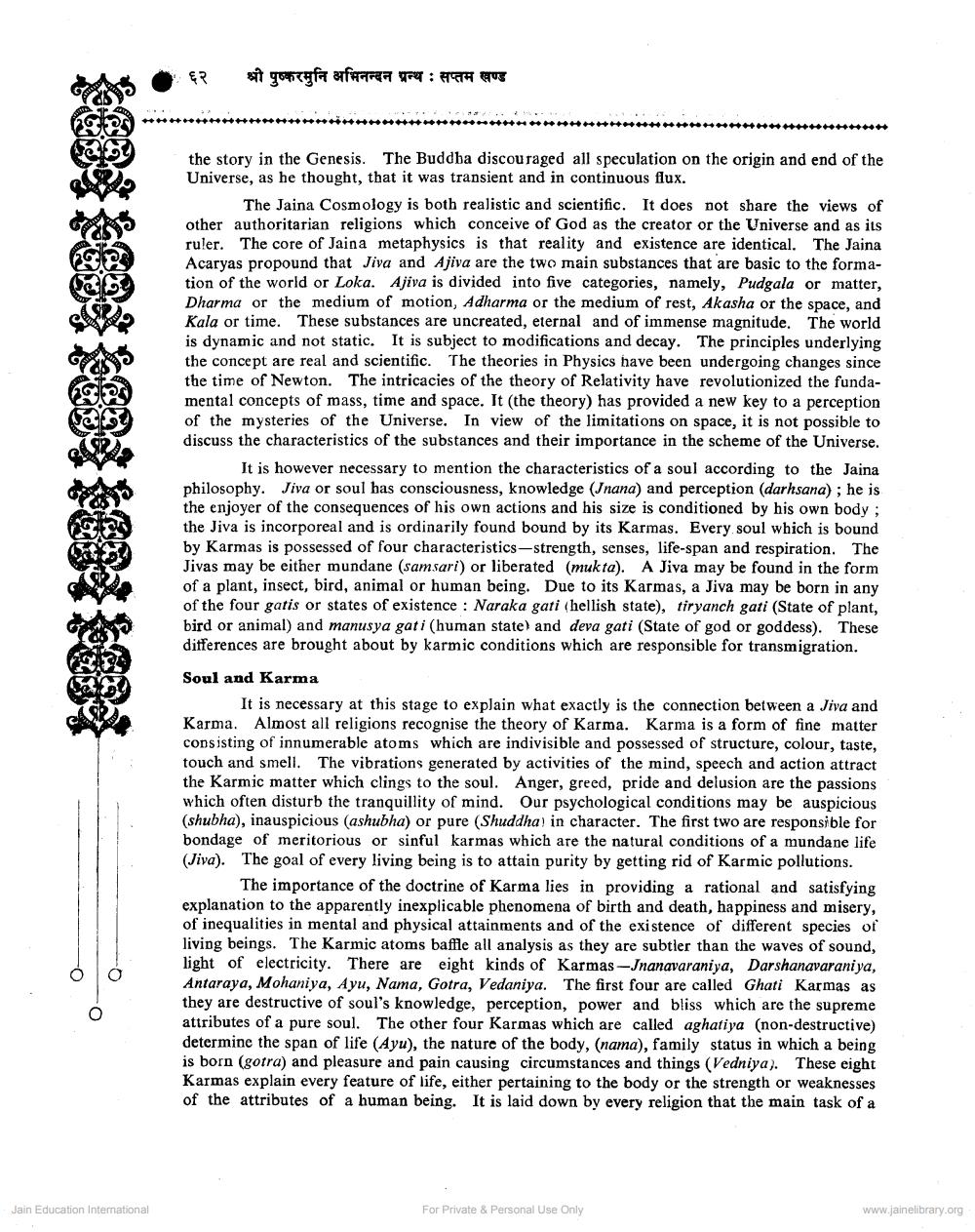________________
६२
श्री पुष्करमुनि अभिनन्दन प्रन्थ : सप्तम खण्ड
the story in the Genesis. The Buddha discouraged all speculation on the origin and end of the Universe, as he thought, that it was transient and in continuous flux.
The Jaina Cosmology is both realistic and scientific. It does not share the views of other authoritarian religions which conceive of God as the creator or the Universe and as its ruler. The core of Jaina metaphysics is that reality and existence are identical. The Jaina Acaryas propound that Jiva and Ajiva are the two main substances that are basic to the formation of the world or Loka. Ajiva is divided into five categories, namely, Pudgala or matter, Dharma or the medium of motion, Adharma or the medium of rest, Akasha or the space, and Kala or time. These substances are uncreated, eternal and of immense magnitude. The world is dynamic and not static. It is subject to modifications and decay. The principles underlying the concept are real and scientific. The theories in Physics have been undergoing changes since the time of Newton. The intricacies of the theory of Relativity have revolutionized the fundamental concepts of mass, time and space. It (the theory) has provided a new key to a perception of the mysteries of the Universe. In view of the limitations on space, it is not possible to discuss the characteristics of the substances and their importance in the scheme of the Universe.
It is however necessary to mention the characteristics of a soul according to the Jaina philosophy. Jiva or soul has consciousness, knowledge (Inana) and perception (darhsana); he is the enjoyer of the consequences of his own actions and his size is conditioned by his own body; the Jiva is incorporeal and is ordinarily found bound by its Karmas. Every soul which is bound by Karmas is possessed of four characteristics-strength, senses, life-span and respiration. The Jivas may be either mundane (sam sari) or liberated (mukta). A Jiva may be found in the form of a plant, insect, bird, animal or human being. Due to its Karmas, a Jiva may be born in any of the four gatis or states of existence : Naraka gati (hellish state), tiryanch gati (State of plant, bird or animal) and manusya gati (human state) and deva gati (State of god or goddess). These differences are brought about by karmic conditions which are responsible for transmigration.
Soul and Karma
It is necessary at this stage to explain what exactly is the connection between a Jiva and Karma. Almost all religions recognise the theory of Karma. Karma is a form of fine matter consisting of innumerable atoms which are indivisible and possessed of structure, colour, taste, touch and smell. The vibrations generated by activities of the mind, speech and action attract the Karmic matter which clings to the soul. Anger, greed, pride and delusion are the passions which often disturb the tranquillity of mind. Our psychological conditions may be auspicious (shubha), inauspicious (ashubha) or pure (Shuddha) in character. The first two are responsible for bondage of meritorious or sinful karmas which are the natural conditions of a mundane life (Jiva). The goal of every living being is to attain purity by getting rid of Karmic pollutions.
The importance of the doctrine of Karma lies in providing a rational and satisfying explanation to the apparently inexplicable phenomena of birth and death, happiness and misery, of inequalities in mental and physical attainments and of the existence of different species of living beings. The Karmic atoms baffle all analysis as they are subtier than the waves of sound, light of electricity. There are eight kinds of Karmas-Jnanavaraniya, Darshanavaraniya, Antaraya, Mohaniya, Ayu, Nama, Gotra, Vedaniya. The first four are called Ghati Karmas as they are destructive of soul's knowledge, perception, power and bliss which are the supreme attributes of a pure soul. The other four Karmas which are called aghatiya (non-destructive) determine the span of life (Ayu), the nature of the body, (nama), family status in which a being is born (gotra) and pleasure and pain causing circumstances and things (Vedniya). These eight Karmas explain every feature of life, either pertaining to the body or the strength or weaknesses of the attributes of a human being. It is laid down by every religion that the main task of a
o
o
Jain Education International
For Private & Personal Use Only
www.jainelibrary.org




